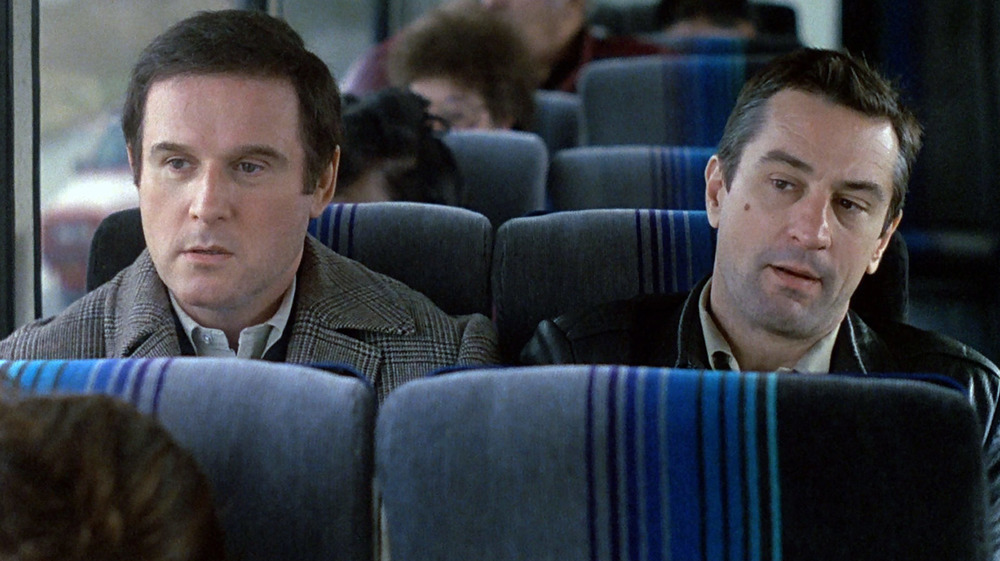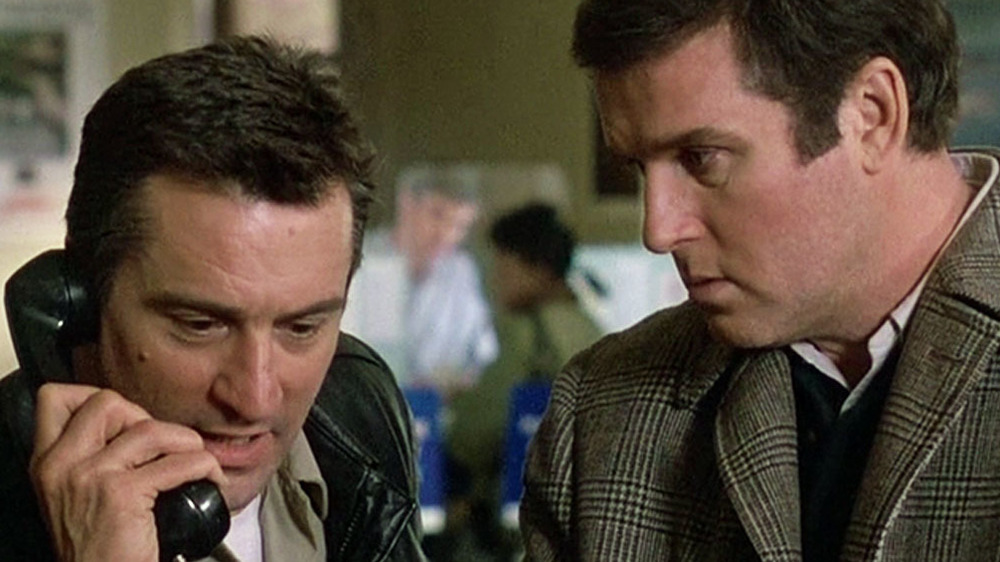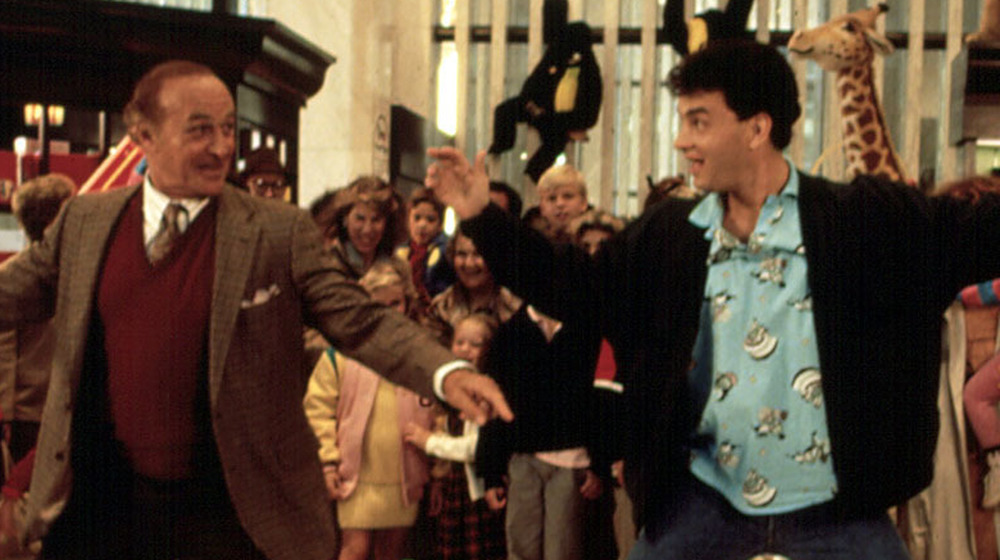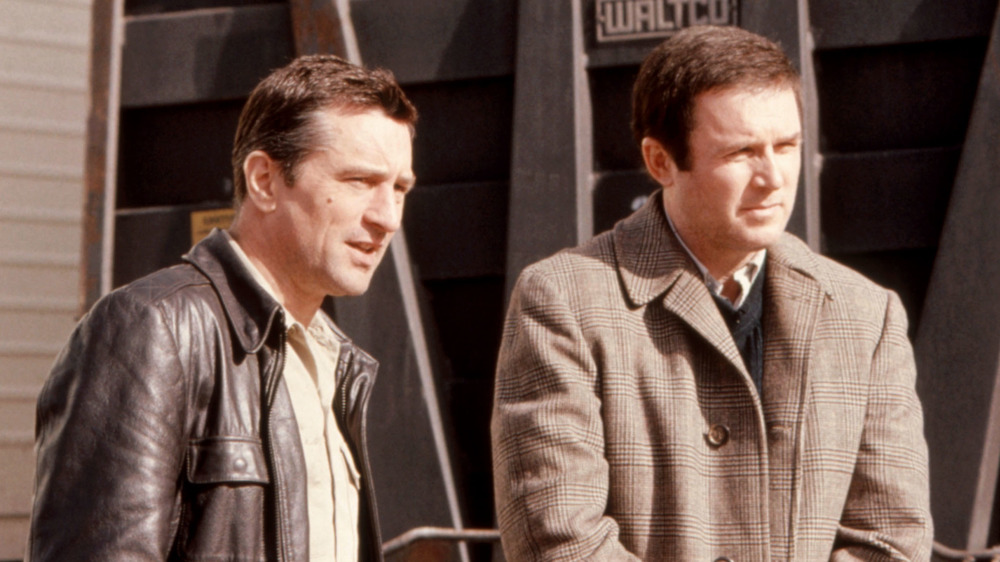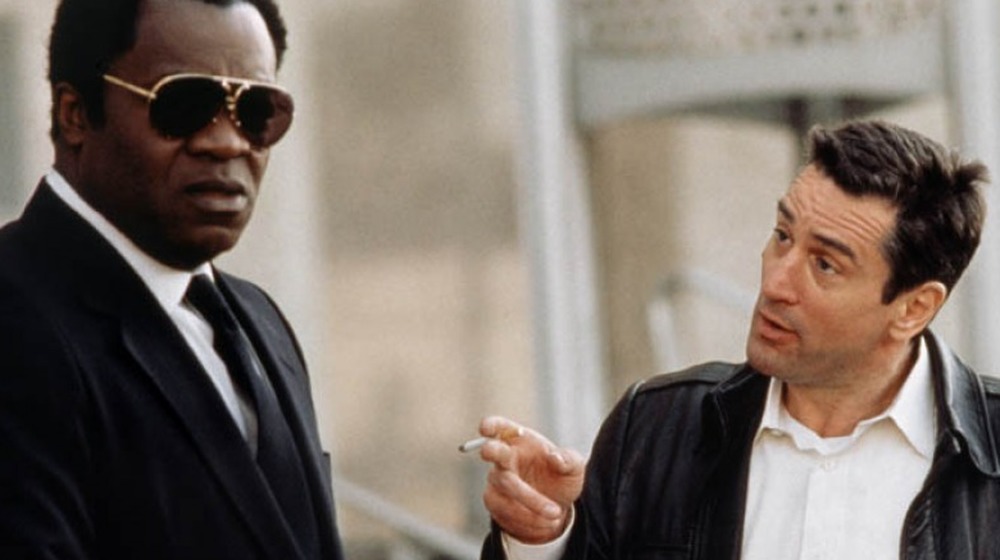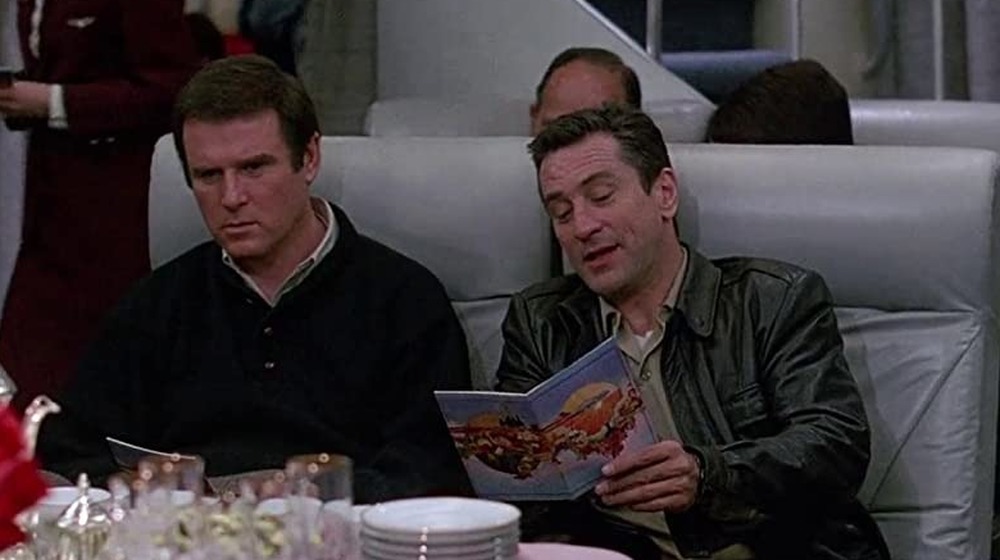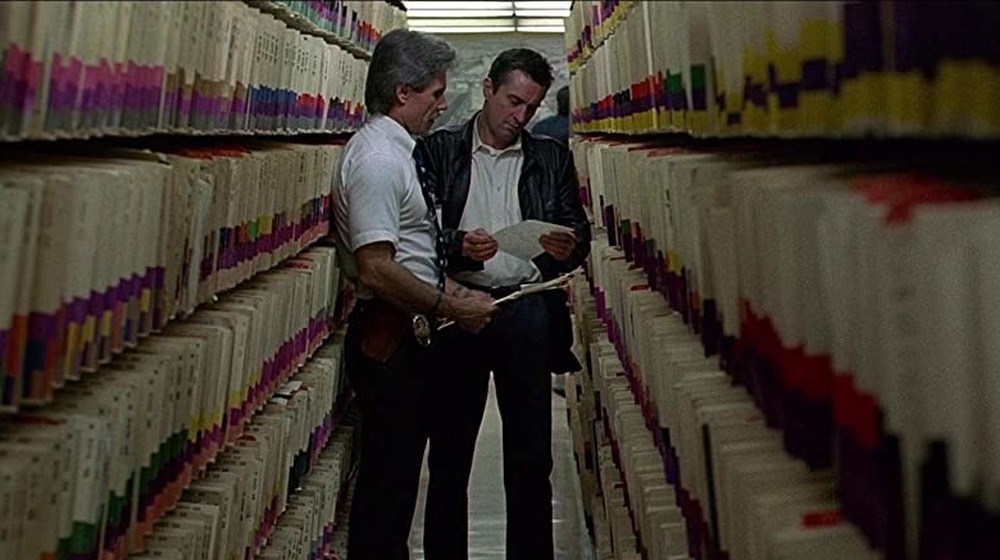Why Midnight Run Is Robert De Niro's Best Movie
The year is 1988. Director Martin Brest is doing well, riding the attention he garnered from his previous movie, 1984's Beverly Hills Cop. His latest movie might prove to be an even greater challenge than developing Eddie Murphy's silver screen phenomenon. Midnight Run features Charles Grodin as an accountant, Jonathan Mardukas, on the run from the mob after jumping bail. The crime boss he used to work for, Jimmy Serrano, wants him dead for embezzling money, and the Feds want to track him down so he can testify against Serrano.
The person charged with getting Jonathan into the Feds' hands is bounty hunter Jack Walsh, played by Robert De Niro. Given De Niro's previous roles and penchant for playing antiheroes, casting him as Walsh — a bitter but sympathetic loser — seems like a mistake. Shouldn't he be one of the gangsters hunting Mardukas?
Luckily, Brest and writer George Gallo had a plan to use the audience's preconceived notions about De Niro's type as fuel. Midnight Run has heart and laughs, and might just be Robert De Niro's best movie.
The obvious positive for Midnight Run
The elevator pitch for Midnight Run was probably something like, "Robert De Niro does comedy."
It marked the first time that De Niro took center stage as a comic actor. Before this movie, he had a small but memorable scene in Terry Gilliam's Brazil (1985). There was his turn as Rupert Pupkin in Martin Scorsese's The King of Comedy (1982), a comedy so black it inspired 2019's Joker. These roles could have prepared the moviegoing public for Midnight Run.
De Niro played Walsh straight, which is the chief strength of his performance. In later roles, he's gone much broader with his comedic performances; just look at The War With Grandpa (2020) and any of the Fockers movies as evidence. In Midnight Run, his annoyance with Mardukas sets off comic sparks. Mardukas is alternately neurotic (he is a hunted man, after all) and touchy-feely in a way that rubs Walsh, an ex-cop turned bounty hunter, wrong. Walsh has learned that you can't have feelings if you want to get the job done; if you slip up and get emotional, you'll get hurt.
The role is an understatedly brilliant comic performance because De Niro lets everyone else push the jokes forward, affording him the freedom to react to them.
The Big connection with Midnight Run
The film could have been far different, and far stranger, had things gone as planned.
In the late 1980s, director Steven Spielberg was preparing to work on a movie co-written by his sister Anne and Gary Ross (Pleasantville, The Hunger Games). Spielberg eventually dropped out, and Penny Marshall took on the project. The movie, Big, about a boy who makes a wish to be an adult that comes true overnight, was to star Tom Hanks.
But Hanks' star was on the rise at the pre-production stage, and his schedule was full, so he was initially unable to take the role. Marshall reached out to De Niro, thinking they might alter the script to accommodate him by making the protagonist grow physically and mentally, rather than just physically as initially planned. De Niro wanted to do a commercial project and agreed to Marshall's plan, but his price tag was prohibitive. Ultimately, the production could not afford him. By that time, Hanks was again available. The rest is history.
Still, De Niro was looking for a crowd-pleasing, commercial role, so when Midnight Run became available, he took it. Audiences got two memorable films out of this little piece of Hollywood history. Had Twentieth Century Fox not flinched at the cost of having De Niro in Big, it would have arrived in a far different form without Hanks' remarkable "boy in a man's body" performance. Likewise, De Niro would have been too busy for Midnight Run.
Chemistry with Charles Grodin
Road movies and chase movies tend to be two-character stories. The duo gets stuck together in close quarters for the majority of a film. They will likely have diametrically opposed personalities to promote some degree of conflict. The success of such stories hinges on whether you like both characters, no matter how polarized their traits may be.
Jack Walsh is emotionally distant, cranky, and keeping secrets, but thanks to De Niro's skill as an actor, you still like him. That leaves the harder role of the morally conflicted accountant up to Grodin. He's a bad guy, a crook whom the audience is conditioned to want to see brought to justice.
But Walsh is conflicted as well, which is precisely what makes the movie work so well. Midnight Run is about two people who are very different but equal in one crucial way: They're paying for their terrible past decisions. By being the broader comic presence, Grodin eases De Niro into the comedy, offering him something to react to. By the last act, we root for both lead characters. The story is strong enough that, had it been a pure action flick rather than a comedy, it would remain compelling entertainment.
De Niro steers away from anger fatigue
In 1988, Robert De Niro was still a few years away from his performances in Goodfellas (1990), Heat (1995), and Casino (1995). He'd just portrayed Al Capone in The Untouchables earlier that year. Prior to that, there was the controversial Angel Heart (1987), in which he played the devil; Once Upon a Time in America (1984), in which he played a former gangster; and Raging Bull (1980), in which he played a violence-prone boxer. That's not to mention his work from the 1970s.
In most of these movies, De Niro's characters are angry and menacing. That's a type he does very well, but one can see why he'd pursue something more commercial, more crowd-friendly, and less dark.
Midnight Run is a perfect transition for the actor. It manages to keep a foot in the crime world we've come to expect his characters to live in, but there's a lightness (literally, thanks to director Martin Brest and cinematographer Donald Thorin's brightly lit compositions) befitting a comedy, as opposed to a drama with occasional comic flourishes.
That doesn't mean Walsh is an uncomplicated character. On the contrary, he tracks down bail-jumpers for a living out of necessity. A former policeman, he wound up on the wrong side of a corrupt force, an event that also turned his personal life upside down. There are legitimate reasons for his cynicism and emotionally closed personality, setting up the odd-couple conflicts Walsh has to work through with the slightly New-Age Mardukas.
Apart from the f-words
Midnight Run was, in its time, one of the tamest films in De Niro's filmography. That might seem surprising at first glance, given the R rating, the organized crime plot element, and the promise of gunplay.
De Niro talks like an ex-cop from Chicago. Crime boss Serrano (Dennis Farina) likewise has a colorful way of expressing himself. At times, bullets fly and people run for their lives. These are the reasons the film got the rating it did. Yet the overall effect is strangely endearing. It could have easily been edited down to achieve a PG-13 rating, a relatively new arrival in the '80s.
The joy of the film is watching Walsh's early irritation with Mardukas slowly turn into a spiky mutual understanding. The two reach a degree of toleration, but the audience never gets the impression that these two will become bona fide friends. When this vignette of their lives is done, it's done.
But this is Hollywood, after all. While the film ends "clean," offering no clear steps toward a sequel, there were three made-for-television additions: Another Midnight Run, Midnight Runaround, and Midnight Run for Your Life. None of these feature the first film's primary stars, and none of them offers any performance equal to De Niro's comic attempts to hide his gradually revealed vulnerability.
Midnight Run ushered in De Niro's turn toward likability. It marked the arrival of his career's second phase and shook away the threat of being stereotyped into irrelevance.
An underdog movie about underdogs
Midnight Run never fails to surprise audiences who tend to forget it among De Niro's other films.
Midnight Run debuted in 1988 as an underdog. The summer of 1988 featured blockbusters like Willow, Big, Red Heat, Crocodile Dundee II, and Rambo III. In July alone, audiences had to choose between A Fish Called Wanda, the Dirty Harry sequel The Dead Pool, and a phenomenon called Die Hard. Success was not guaranteed.
The film earned a worldwide total of $81.6 million off of a $35 million budget. It earned glowing reviews upon release and retains a fresh certification from Rotten Tomatoes, with a very positive audience score. Roger Ebert's review stated, "Whoever cast De Niro and Grodin must have had a sixth sense for the chemistry they would have; they work together so smoothly, and with such an evident sense of fun, that even their silences are intriguing."
The chemistry Ebert mentioned comes in part from the movie's rich character backstories, which are as mature and poignant as anything De Niro had done up to that point, even with the laughs. It's a story about two seemingly opposite men who share regret about the choices they've made. That comedy could come from such a weighty subject is a credit to all of the filmmakers involved. It's especially striking to see that De Niro had such a pivot in him.
